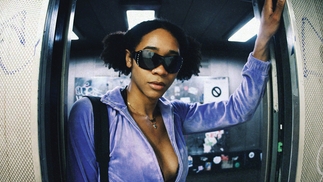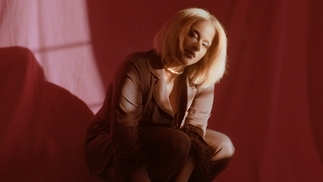Recognise: Debit

On her new album for Modern Love, Mexican-American producer, DJ and audio engineer Delia Beatriz, aka Debit, combines ancient Mayan wind instruments with machine learning. Ahead of its release, she records a “pre-hispanic to post/transhispanic ambient mix” for the Recognise series, and speaks to Eoin Murray about DJing for Azaelia Banks, her desire to contribute to the canon of electronic music, and making ambient music that goes beyond “beautiful”
Delia Beatriz stands at a unique intersection in electronic music. As Debit, the Monterrey, Mexico-born, New York-based producer, DJ, audio engineer and live artist has released feverish club music, fusing the triplet rhythms of tribal guarachero with industrial techno grit. She has simultaneously explored the outer reaches of ambient music, with a taste for intoxicating dissonance. Her creative CV is a thrilling confluence of projects, from her solo releases for the Mexican label NAAFI, to her percussive rework of Missy Elliot’s ‘Get Ur Freak On’ and dizzying take on Bad Bunny’s ‘No Te Hagas’. This month, she will step into a new phase with the release of her second album, ‘The Long Count’, via the esteemed experimental label Modern Love, in which her research into ancient Mayan wind instruments is merged with machine-learning techniques.
When we speak to Beatriz in mid-December over a video call, she is in Laredo, Texas, visiting her mother and pet dogs. She has just arrived from LA, where she played her final shows of the year as backing DJ for rap renegade Azealia Banks. It’s a regular gig she’s had since August, and as her own music veers into more out-there territory, it’s given her a valuable sense of balance. “Having that professional experience makes me feel anchored in pop culture in a way that allows me to then float further away from it,” she says. “It's also incredibly challenging. There’s a lot at stake when working with people at that level.”
Beatriz is not one to shy away from a challenge. 2021 saw her produce music for the visionary Mexican fashion brand Barragán, and design a sample pack for the Splice sound library. Before the year is out, she will finish work on a collaborative sound design project with Uruguayan producer Lechuga Zafiro, for which both artists have exchanged field recordings captured in the landscapes of their native countries; the aim is to craft a release of cross-equatorial club music. It’s a lot to juggle, but listening to Beatriz speak with infectious enthusiasm, you get the sense that it’s an ever-shifting state that she thrives in.
“Having a range of projects keeps me engaged,” she says. “[Otherwise] I think stuff can become pretty monotonous and redundant, and there’s less excitement.” Of course, the history of electronic music is full of artists who have traversed styles and sounds throughout their careers; Beatriz says that variety is “inherent to the medium.” Along with musique concrète founder Pierre Schaeffer and the composer Éliane Radigue, she cites electronic ambient pioneer and Roxy Music synthesist Brian Eno as a key reference point: “He was in glam rock and lived in the celebrity moment, but then also went on to invent new ways of relating to music. That, for me, is the end goal.
“I do think it's going to be a lifelong endeavour — trying to really contribute to the medium [of electronic music] beyond just knowing how to work the instruments and please a crowd,” she continues. “[But] I don't just want to make niche music that only the educated, musique concrète world can relate to. So now, in seeing Azealia Banks’ fans, I’m seeing what resonates with them and why, and trying to understand how I can incorporate that into my own work.”

After a decade of learning her craft — including time spent in Buenos Aires building her own oscillators, playing noisy improvised live shows and releasing a gnarly synth/EBM EP with her band HDXD — Beatriz’s debut album as Debit, ‘Animus’, arrived in 2018 via NAAFI. A blend of thunderous triplet beats and full-bodied ambient experiments, it was soon followed by the ‘Love Discipline’ and ‘System’ EPs. Each release showcased a different side to Debit’s technical prowess, which had by then evolved from her early days of circuit bending into full-scale gear worship.
In 2020, Beatriz graduated with a masters in Music Tech from NYU, where her engineering and production skills reached new heights. It was during her studies that she developed an interest in machine learning and AI in music, which has formed the basis of her most ambitious work to date: ‘The Long Count’.
“I realised there was nothing that explored [the full potential] of this tech alongside archaeology,” she says. “Most of the datasets and databases [of sounds] were of Western music.” She decided to apply this new field of research to her own studies in pre-hispanic, specifically ancient Mayan, culture. After painstakingly gathering small (really, really small) audio samples of Late Classic Mayan wind instruments — whistles, ocarinas, flutes and trumpets — from the archive of the Mayan Studies Institute at the Universidad Nacional Autónoma de México, Beatriz began the arduous task of developing a dataset of sounds, which were in turn mapped and processed using machine learning to become the haunting tones that ooze through the album.
With a view to opening up new ways of relating to and conversing with pre-colonial history, Beatriz used these ultra modern tools to engage with the “ancestral technology” of the instruments. The result is a masterfully composed ambient album of uncannily organic textures, with a mysterious, psychedelic intensity that transcends conventional rhythm and structure. “When I was writing this, I felt like the instruments created a weird physical response,” she says, describing the interdimensional rituals she believes they may once have been used for.
In using this technique, Beatriz sought to take the first step in what she dreams will be a wider use of this mode of research in ancient Mayan music. While there’s no way of knowing how these instruments were really played using today’s tech, she has a fantasy that one day AI will help us get there. But for now, with ‘The Long Count’, she is using these tools to create something more creative and speculative. “A lot of the ways these instruments are played or understood now still impose a lot of our own notions onto them,” she says. “So it's already an exercise of the imagination, informed by the little bits and pieces of history we have. So I thought I would just lean into the sci-fi of it.”
‘The Long Count’ title refers to the Mesoamerican Long Count calendar — the non-linear, cycle-based concept of time that the ancient Mayans used to understand and prophesy the beginnings and endings of eras in the world. These cosmological cycles are divided into 13 days and nights, which are reflected in the ancient pyramid-temples found in Mayan territory, and in the album’s track titles. Beatriz sequences these tracks out of order, with some days and nights missing, as a reflection on “the dispersal of information we have about the past... and the [ancient Mayans’] non-linear notion of time as a spiral. I wanted to capture that aesthetically, without making it a full-on study or narrative about time.”

The album is a fitting addition to the Modern Love catalogue. As a label that boasts the greyscale productions of Andy Stott and the apocalyptic beats of Demdike Stare, it appealed to Beatriz’s desire to shake up the parameters of electronic ambient music, and all the baggage that term carries. “[Those artists] were really important to me because they allowed me to see that you could go in any direction with the materiality of the sound,” she says. “In an era when innovation is conflated with gloss, they showed me that you could degrade it.”
For Beatriz, the word “ambient” has been for too long tied to notions of “beauty” and “relaxation”, with steadily diminishing returns. “I find it very limiting to understand the whole genre that way. It has evolved in so many other ways,” she says. “I do think ambient is the ultimate representation of electronic music, and I find it really frustrating that people think it has to be beautiful... I want ambient to be more. I want something that takes on the medium a little bit, and takes it more seriously. This idea of taking out the drum and calling it ambient is a disservice to its potential.”
Beatriz holds all the music she loves with this level of reverence; it’s no surprise that when she DJs she wields her selections with the same dynamism and dexterity as she does her own productions. Debit’s DJ sets jolt and swerve through mutated strands reggaeton, dembow and other percussive club styles from Latin America and beyond, while exhilarating bursts of techno and experimental electronics are mixed with an alchemical touch, pointing once again to Beatriz’s ability to fuse styles in a way that is at once challenging and enticing.
“I find DJing to be spiritual,” she says. “When I have a good show, and I connect with a crowd, there’s nothing like it... It’s about giving the bangers that I know will work, but also bringing the stuff I’m introducing people to, and knowing how to blend it well without being disruptive.”
Looking ahead, Beatriz has some US shows in the pipeline for ‘The Long Count’, alongside a number of tour dates with Andy Stott. She plans to develop a “theatrical”, almost “ritual”-style, live show and will make her European debut in April at renowned Dutch experimental music festival, Rewire. She’s also toying with the idea of a techno release, after a “life-altering experience” seeing Detroit don Juan Atkins play a few months ago. Whatever the next phase brings, she will be tackling it with the same determined, innovative spirit she has brought to her musical pursuits since day one. And she’s inviting us to join her at her intersection, where the challenge of stretching electronic music’s potential is at its most exciting.
“It can feel illegible, it can feel enigmatic, but it’s not pretentious,” she says. “I’m trying to be as genuine as I can with myself, without letting the work become alienating. But I don’t want to assume that people can’t handle more. It’s all about navigating that line.”
For her Recognise mix, Beatriz has shared a 30-minute “pre-hispanic to post/transhispanic ambient mix” to help provide further sonic context for ‘The Long Count’. “It includes some of the greatest names, along with more obscure contemporaries, in the body of music that uses, interprets and processes indigenous / pre-hispanic instrumentation via electronic music, or by way of various modern genres. It could be argued that functionally – and at its roots – this is ritual instead of the more common chill out ambient."
Check it out below. 'The Long Count' will be released on 18th February via Modern Love. Pre-order it here.
Tracklist:
Ilhuicamina ‘El Canto de los Espiritus’
Luis Perez ‘Ipan in Xitli Metzli’
Suspended Memories (Steve Roach, Jorge Reyes) ‘Night Devotion’
Unknown Recording ‘La Vida’
Tito la Rosa ‘Spirit of the Forest’
Eblen Macari ‘Supernova en Macuspana’
Manrico Montero ‘Like Golden Blossoms In The Rain’
Maria Sabinas ‘Audios de ceremonia de hongos’ (FX and source unknown)
Beatriz Pichi Malén ‘Cancion Sagrada de la fuerza’
Jorge Reyes ‘Omeyotl’
Antonio Zepeda ‘El Colibrí Zurdo’
Mictlan ‘Into Mictlan’
Chacmul ‘Warrior’
Eblen Macari ‘Planetarios Suite’
Roberto Morales Manzanares ‘Agua Derramada’
Debit ‘7th Night’





